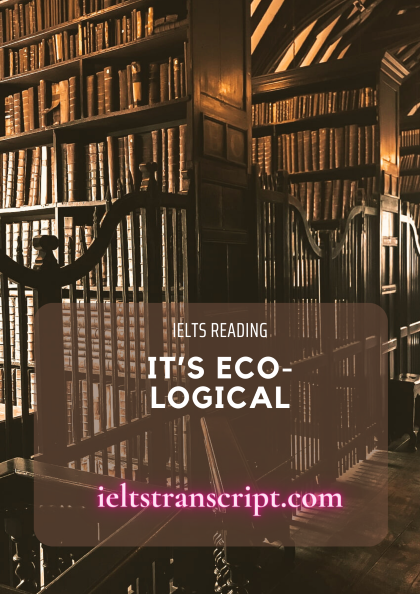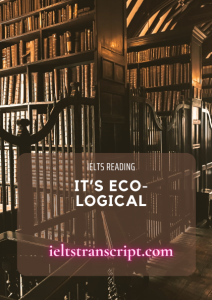- Đối với sản phẩm có giá: Sau khi chúng tôi ghi nhận thông tin đã thanh toán sản phẩm của bạn, sản phẩm sẽ được mở khóa và bạn có thể xem trực tiếp và tải tài liệu sản phẩm.
- Đối với thành viên trả phí: Bạn có thể mua và thanh toán sản phẩm với giá 0đ để tải tài liệu sản phẩm.
- Bạn có thể liên hệ với chúng tôi để được hỗ trợ mở khóa sản phẩm sớm nhất.
IT’S ECO-LOGICAL
- Chúng tôi chấp nhận các phương thức thanh toán sau đây: Thẻ tín dụng, thẻ ghi nợ, PayPal, chuyển khoản ngân hàng và tiền mặt.
Chúng tôi sẽ không thu thêm phí cho bất kỳ hình thức thanh toán nào.
- Nếu bạn gặp vấn đề về sản phẩm của chúng tôi trong thời gian sử dụng, vui lòng liên hệ với chúng tôi để được hỗ trợ xử lý sớm nhất nhé.
Xem trước mẫu
IT’S ECO-LOGICAL
Planning an eco-friendly holiday can be a minefield for the well- meaning traveller, says Steve Watkins. But help is now at hand.
If there were awards for tourism phrases that have been hijacked, diluted and misused then ‘ecotourism’ would earn top prize. The term first surfaced in the early 1980s reflecting a surge in environmental awareness and a realisation by tour operators that many travellers wanted to believe their presence abroad would not have a negative impact. It rapidly became the hottest marketing tag a holiday could carry.
These days the ecotourism label is used to cover anything from a two-week tour living with remote Indonesian tribes, to a one-hour motorboat trip through an Australian gorge. In fact, any tour that involves cultural interaction, natural beauty spots, wildlife or a dash of soft adventure is likely to be included in the overflowing ecotourism folder. There is no doubt the original motives behind the movement were honourable attempts to provide a way for those who cared to make informed choices, but the lack of regulations and a standard industry definition left many travellers lost in an ecotourism jungle.
It is easier to understand why the ecotourism market has become so overcrowded when we look at its wider role in the world economy. According to World Tourism Organisation figures, ecotourism is worth US$20 billion a year and makes up one-fifth of all international tourism. Add to this an annual growth rate of around five per cent and the pressure for many operators, both in developed and developing countries, to jump on the accelerating bandwagon is compelling. Without any widely recognised accreditation system, the consumer has been left to investigate the credentials of an operator themselves. This is a time-consuming process and many travellers usually take an operator’s claims at face value, only adding to the proliferation of fake ecotours.
However, there are several simple questions that will provide qualifying evidence of a company’s commitment to minimise its impact on the environment and maximise the benefits to the tourism area’s local community. For example, does the company use recycled or sustainable, locally harvested materials to build its tourist properties? Do they pay fair wages to all employees? Do they offer training to employees? It is common for city entrepreneurs to own tour companies in country areas, which can mean the money you pay ends up in the city rather than in the community being visited. By taking a little extra time to investigate the ecotourism options, it is not only possible to guide your custom to worthy operators but you will often find that the experience they offer is far more rewarding.
The ecotourism business is still very much in need of a shake-up and a standardised approach. There are a few organisations that have sprung up in the last ten years or so that endeavour to educate travellers and operators about the benefits of responsible ecotourism. Founded in 1990, the Ecotourism Society (TES) is a non-profit organisation of travel industry, conservation and ecological professionals, which aims to make ecotourism a genuine tool for conservation and sustainable development. Helping to create inherent economic value in wilderness environments and threatened cultures has undoubtedly been one of the ecotourism movement’s most notable achievements. TES organises an annual initiative to further aid development of the ecotourism industry. This year it is launching ‘Your Travel Choice Makes a Difference’, an educational campaign aimed at helping consumers understand the potential positive and negative impacts of their travel decisions. TES also offers guidance on the choice of ecotour and has established a register of approved ecotourism operators around the world.
A leading ecotourism operator in the United Kingdom is Tribes, which won the 1999 Tourism Concern and Independent Traveller’s World ‘Award for Most Responsible Tour Operator’.
...HỆ SINH THÁI
Steve Watkins nói, việc lập kế hoạch cho một kỳ nghỉ thân thiện với môi trường có thể là một vấn đề đối với những người thích du lịch. Nhưng hiên nay sự giúp đỡ thì luôn sẵn sàng.
Nếu có giải thưởng cho các cụm từ du lịch như bị chiếm đoạt, giảm đi và sử dụng sai mục đích thì ‘du lịch sinh thái’ sẽ giành được giải cao nhất. Thuật ngữ này đã xuất hiện lần đầu tiên vào đầu những năm 1980 đã phản ánh sự gia tăng nhận thức về môi trường cũng như nhận thức của các công ty lữ hành rằng nhiều du khách cần tin rằng sự hiện diện của họ ở nước ngoài sẽ không có một tác động tiêu cực nào. Nó nhanh chóng trở thành xu hướng nổi bật nhất cho lựa chọn cho một kỳ nghỉ.
Ngày nay, vé du lịch sinh thái được sử dụng bao gồm từ chuyến du lịch hai tuần sống với các bộ tộc Indonesia xa xôi, đến chuyến đi thuyền máy kéo dài một giờ qua một hẻm núi ở Úc. Trên thực tế, bất kỳ chuyến tham quan nào liên quan đến tương tác văn hóa, danh lam thắng cảnh tự nhiên, động vật hoang dã hoặc một chút phiêu lưu nhẹ nhàng đều có thể được đưa vào danh mục du lịch sinh thái. Không còn nghi ngờ gì nữa, động cơ ban đầu đằng sau xu hướng này là những nỗ lực không ngừng nghỉ nhằm cung cấp cách để đưa ra những lựa chọn đúng đắn cho những người quan tâm đến xu hướng, nhưng việc thiếu các quy định và một định nghĩa tiêu chuẩn công nghiệp đã khiến nhiều du khách rơi vào tình trạng rối rắm về du lịch sinh thái.
Dễ hiểu hơn tại sao thị trường du lịch sinh thái lại trở nên quá tải khi chúng ta nhìn vào vai trò rộng lớn hơn của nó trong nền kinh tế thế giới. Theo số liệu của Tổ chức Du lịch Thế giới, du lịch sinh thái trị giá 20 tỷ USD mỗi năm và chiếm 1/5 tổng lượng du lịch quốc tế. Thêm vào đó, tốc độ tăng trưởng hàng năm khoảng 5% và áp lực đối với nhiều nhà khai thác, cả ở các nước phát triển và đang phát triển, phải nhảy vào cuộc đua tăng tốc đầy hấp dẫn. Không có bất kỳ hệ thống cấp phép được công nhận nào được biết đến rộng rãi, người tiêu dùng có thể tự mình điều tra giấy chứng nhận của một nhà điều hành. Đây là một quá trình không chỉ tốn thời gian và nhiều du khách thường yêu cầu nhà điều hành xác nhận quyền sở hữu theo mệnh giá, mà nó còn làm tăng thêm sự gia tăng của các du lịch sinh thái giả mạo.
Tuy nhiên, có một số câu hỏi đơn giản là sẽ cung cấp bằng chứng đủ có điều kiện về cam kết của công ty trong việc giảm thiểu tác động của nó lên môi trường và tối đa hóa lợi ích cho cộng đồng địa phương của khu du lịch. Ví dụ, công ty có sử dụng các vật liệu tái chế hoặc bền vững, được thu hoạch tại địa phương để xây dựng các khu du lịch của họ không? Họ có trả lương công bằng cho tất cả nhân viên không? Họ có cung cấp các chương trình đào tạo cho nhân viên không? Thông thường các doanh nghiệp thành phố sở hữu các công ty du lịch ở các khu vực đồng quê, điều này có nghĩa là số tiền bạn sẽ trả cuối cùng là cho các doanh nghiệp tại thành phố chứ không phải cho khu vực được du khách đến thăm. Bằng cách dành thêm một chút thời gian để nghiên cứu các lựa chọn du lịch sinh thái, nó không chỉ có thể hướng khách hàng thân thiết của bạn đến với các nhà khai thác đáng tin cậy mà bạn còn thấy rằng trải nghiệm mà họ cung cấp còn bổ ích hơn nhiều.
Ngành kinh doanh du lịch sinh thái vẫn đang rất cần một sự thay đổi và một cách tiếp cận chuẩn hóa. Có một vài tổ chức đã được thành lập trong khoảng mười năm trở lại đây để nỗ lực chỉ dẫn du khách và các nhà khai thác về lợi ích của du lịch sinh thái có trách nhiệm. Được thành lập vào năm 1990, Hiệp hội Du lịch Sinh thái (TES) là một tổ chức phi lợi nhuận của ngành du lịch, các chuyên gia bảo tồn và sinh thái học, nhằm mục đích đưa du lịch sinh thái trở thành một công cụ đáng tin cậy để bảo tồn và phát triển bền vững. Giúp tạo ra giá trị kinh tế vốn có trong môi trường hoang dã và các nền văn hóa bị đe dọa chắc chắn là một trong những thành tựu đáng chú ý nhất của hoạt động du lịch sinh thái. TES tổ chức một cuộc sáng kiến hàng năm nhằm hỗ trợ sự phát triển hơn nữa của ngành du lịch sinh thái. Năm nay, công ty sẽ phát động ‘Sự
...Để xem được đầy đủ nội dung và tải dữ liệu, bạn phải trở thành thành viên của chúng tôi và trả phí cho tài liệu (nếu có)











